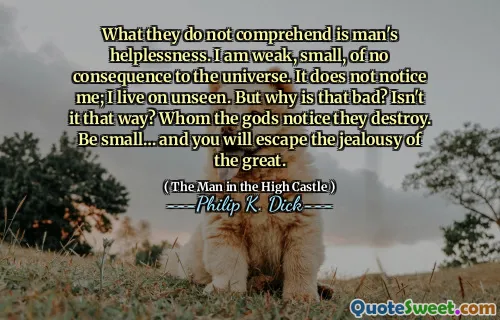
The Nazis have no sense of humor, so why should they want television? Anyhow, they killed most of the really great comedians. Because most of them were Jewish. In fact, she realized, they killed off most of the entertainment field. I wonder how Hope gets away with what he says. Of course, he has to broadcast from Canada. And it's a little freer up there. But Hope really says things. Like the joke about Goring . . . the one where Goring buys Rome and has it shipped to his mountain retreat and then set up again. And revives Christianity so his pet lions will have something to
The quote reflects a perspective on the impact of the Nazis on culture and humor. It states that the regime lacked a sense of humor, and this disdain for comedy resulted in the persecution and murder of many comedians, particularly those of Jewish descent. This loss extended to the broader entertainment industry, significantly diminishing the cultural landscape during that time. The speaker also notes their curiosity about how comedian Bob Hope manages to deliver sharp content from Canada, where there might be less censorship.
The mention of a specific joke about Hermann Göring highlights the audacity that exists in political satire, even in the face of oppressive regimes. The humor in the joke illustrates a clever subversion of Nazi ideology and governance by imagining Göring reviving Christianity for his own trivial purposes. This kind of comedic commentary serves as a form of resistance against totalitarianism and reflects the innate human need to find humor even amidst severe oppression.











